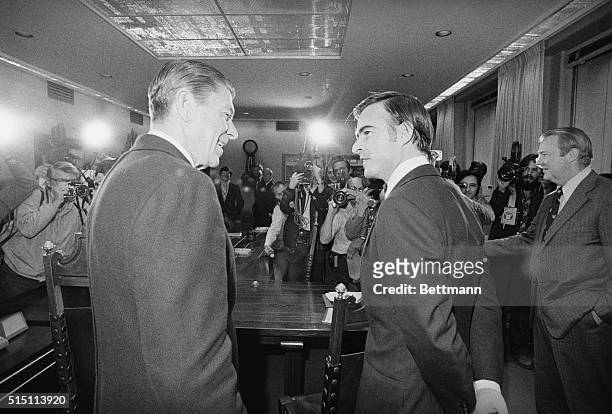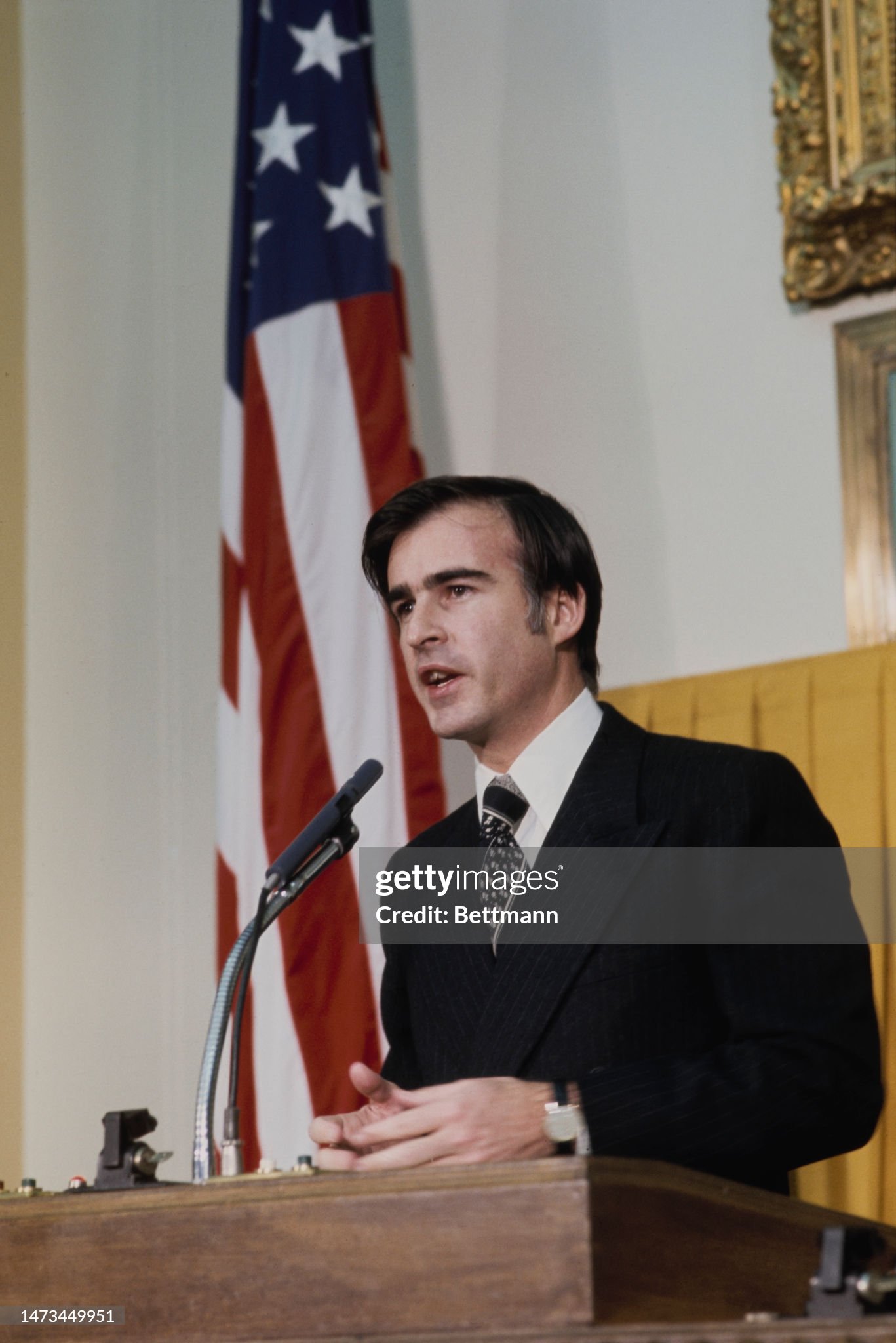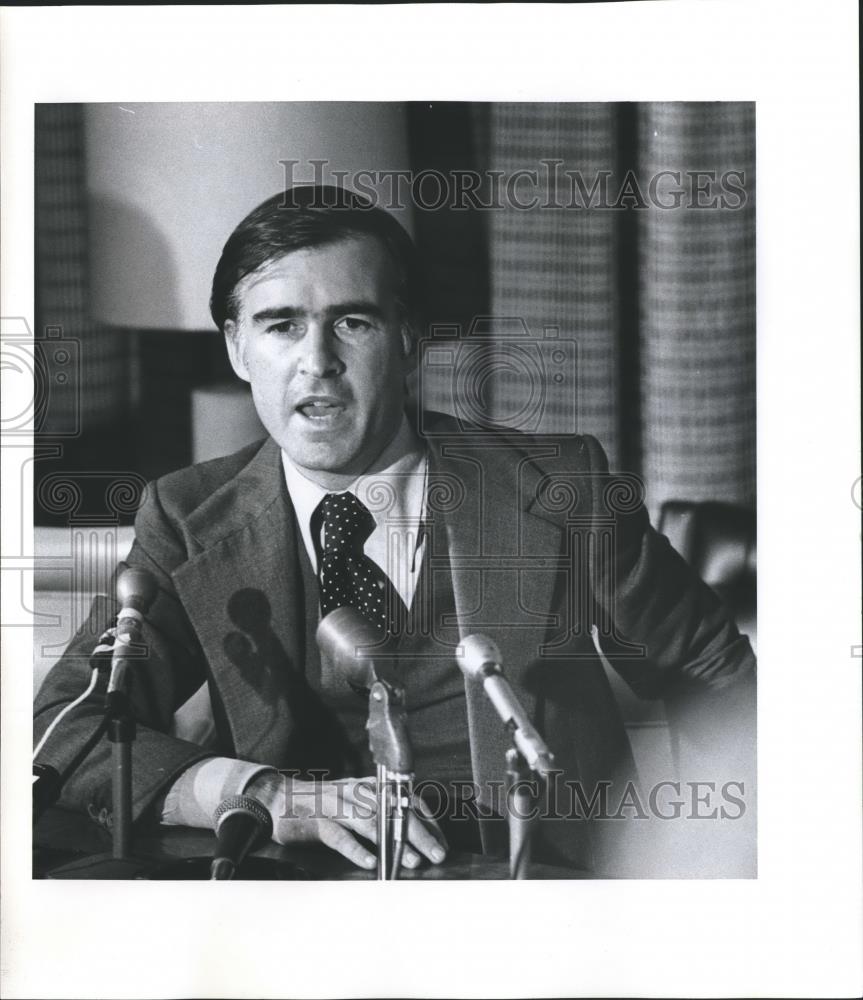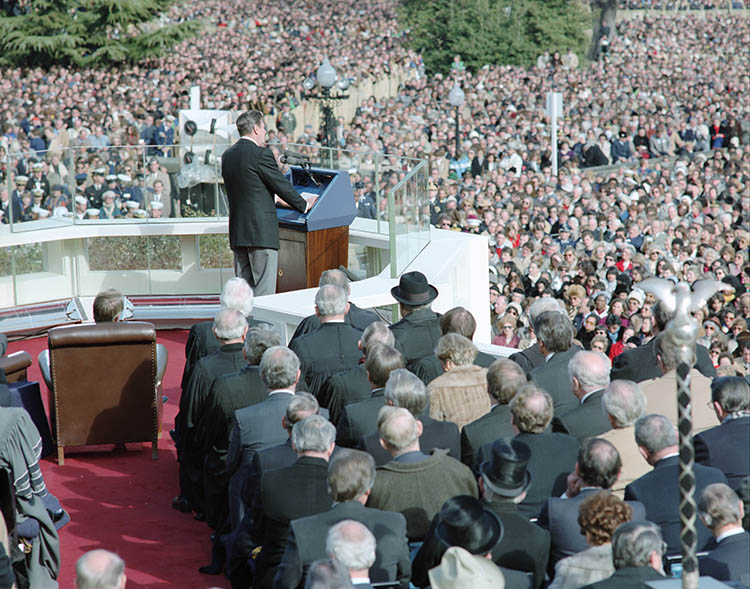49ersfootball
Well-known member
Monday, December 8th, 1980: President Brown hosting President-elect Reagan for transition meeting
11:00 AM EST
White House
Washington, DC

President Jerry Brown welcomes President-elect Ronald Reagan to the White House during the transition meeting.
Monday, December 8th, 1980 was the big day that Ronald Wilson Reagan entered the White House as the President-elect for a formal meeting with President Edmund Gerald Brown, Jr., because it was quite ironic considering the two had done a transition meeting back in Sacramento from 1974 when the younger Brown won the CA Governorship. Both Reagan & Brown had been in contact since the election, as Brown prepared transferring the Presidency to either Reagan or Carter. With the election finally decided on December 1st, Reagan received an invitation to 1600 Pennsylvania Avenue for the next Monday. He was hosted inside the Oval Office, while Vice President-elect George HW Bush met with outgoing Vice President Jimmy Carter at the Number One Observatory Circle.
As extensively covered by the press: Linda Ronstadt-Brown hosted Nancy Reagan for a conversation at the East Wing. Outside the White House, about 573 demonstrators assembled to protest Reagan's election & demanded new efforts stopping certification of the IL election results. Some were holding signs "Carter is the REAL President!" or "Reagan is Illegitimate".
Originally, the meeting was supposed to be scheduled for an HR, but it lasted 95 minutes. Only then reporters of the White House Press Corps were granted access to the Oval Office with Brown & Reagan delivering some remarks & taking some questions.
President Brown: "Good morning Ladies and Gentlemen and my fellow Americans, today I had the distinct honor of hosting President-elect Reagan to the White House. Today, we had the chance to personally meet face-to-face once again. As many of you know, this isn't the first time there's been a transition from Brown to Reagan then from Reagan to Brown, dating back to the California Governorship in 1967 and 1975 respectively (laughter from those in the press corps). Now going back to the task at hand: we had the chance to discuss a wide range of various issues affecting our nation, the business of government and a host of other issues on the international front. It was a very polite and productive discussion. The President-elect asked me several questions to make sure a smooth transition of power occurs. I have personally pledged my full cooperation after already instructing my team and all federal agencies to reach out to his team. I think after this tumultuous election, it is very vitally important we sit here together and assuring the American people and the world that the transition from one administration to the next one occurs in an organized and professional fashion. Let me again thank you, Mr. President-elect, for your commitment to ensure such a smooth thorough process. Sir, the floor is all yours."
(President Brown & President-elect Reagan shaking hands)
President-elect Reagan: "Thank you very much Mr. President. Let me again thank you for your cooperation and commitment to make sure our country is well. I think all Americans can be proud that you, President Brown, guided us through some difficult 4 years, international crises and a contested election with a steady hand. Americans will remember that. Now, as the President said, we talked about several issues affecting our nation that will require prompt actions by the current and incoming administration. I can already tell you that my team will be granted resources of federal agencies to working out an economic emergency program which I will submit to Congress soon after taking office. Our economic situation requires swift action and I'm ready to take whatever steps necessary. Additionally, the President informed me about the ongoing stalemate as a result of Argentina's deadly invasion of Chile. I'm very concerned about these reports and will soon outline my policies to maintain the peace. In the meantime, President Brown and his administration will be in steady contact with me and my top staff. America speaks with one voice here. However, let me add that there's always one president at a time, and therefore, I will not comment on President Brown's decisions while he is the commander-in-chief. Thank you once again, Mr. President, also in the name of Nancy, who is having a meeting with Mrs. Brown and Vice President-elect Bush, meeting with Vice President Carter."
President Brown: "Thank you very much again. Alright, we have a few minutes of questions. Madam over there. Go ahead."
Reporter 1: "Mr. President, Republican members of Congress are proposing controversial legislation called Election Integrity and also pushing on introducing a constitutional amendment which would eliminate ballot access methods in all 51 states. What's your opinion on this? And President-elect Reagan, would you be willing to support this?"
President Brown: "I haven't heard about any legislation regarding the so-called Election Integrity at this moment since we're in the lame duck session. It's an issue that might come up for debate at a later date. Today my focus is on making sure the transition of power occurs without further interruption so that President-elect Reagan and his team are ready on Day One. Because when they are, it's in the best interest of America."
President-elect Reagan: "I have no comment to add on the subject."
Reporter 1: "But Mr. President, don't you have an opinion on the controversial legislation and the ramif...."
President Brown: "I stand by my current position. The presidential election we just had was conducted in accordance with the laws and the constitution. Next question please."
Reporter 2: "Mr. President-elect. There's speculation about who would you appoint to replace the retiring Supreme Court Associate Pat Brown on the US Supreme Court. Who would you select as his replacement?"
President-elect Reagan: "Associate Justice Edmund G. Brown, Sr., had recently announced his plans of stepping down from the US Supreme Court after nearly 13 years. I thanked him for his service to our country and I will not reveal any plans on whom I would replace him with at this time. I can assure you and the public that I will appoint a successor in due time, but cannot elaborate any further."
Reporter 2: "And------if I might----------will you and Mrs. Reagan live in the White House full-time?"
(Laughter ensues throughout the Oval Office)
President-elect Reagan : (Laughs) "I can assure you and the public that Nancy and I will be proud to calling the White House our new home. I kind of expected this question at some point. But not already today."
President Brown: "It's never too early. You'll learn that the hard way pretty soon here."
President-elect Reagan: "Nancy and I will let you know at some point. Don't worry. I will let you know first."
Reporter 2: "Alright. I will take you at your word sir."
11:00 AM EST
White House
Washington, DC

President Jerry Brown welcomes President-elect Ronald Reagan to the White House during the transition meeting.
Monday, December 8th, 1980 was the big day that Ronald Wilson Reagan entered the White House as the President-elect for a formal meeting with President Edmund Gerald Brown, Jr., because it was quite ironic considering the two had done a transition meeting back in Sacramento from 1974 when the younger Brown won the CA Governorship. Both Reagan & Brown had been in contact since the election, as Brown prepared transferring the Presidency to either Reagan or Carter. With the election finally decided on December 1st, Reagan received an invitation to 1600 Pennsylvania Avenue for the next Monday. He was hosted inside the Oval Office, while Vice President-elect George HW Bush met with outgoing Vice President Jimmy Carter at the Number One Observatory Circle.
As extensively covered by the press: Linda Ronstadt-Brown hosted Nancy Reagan for a conversation at the East Wing. Outside the White House, about 573 demonstrators assembled to protest Reagan's election & demanded new efforts stopping certification of the IL election results. Some were holding signs "Carter is the REAL President!" or "Reagan is Illegitimate".
Originally, the meeting was supposed to be scheduled for an HR, but it lasted 95 minutes. Only then reporters of the White House Press Corps were granted access to the Oval Office with Brown & Reagan delivering some remarks & taking some questions.
President Brown: "Good morning Ladies and Gentlemen and my fellow Americans, today I had the distinct honor of hosting President-elect Reagan to the White House. Today, we had the chance to personally meet face-to-face once again. As many of you know, this isn't the first time there's been a transition from Brown to Reagan then from Reagan to Brown, dating back to the California Governorship in 1967 and 1975 respectively (laughter from those in the press corps). Now going back to the task at hand: we had the chance to discuss a wide range of various issues affecting our nation, the business of government and a host of other issues on the international front. It was a very polite and productive discussion. The President-elect asked me several questions to make sure a smooth transition of power occurs. I have personally pledged my full cooperation after already instructing my team and all federal agencies to reach out to his team. I think after this tumultuous election, it is very vitally important we sit here together and assuring the American people and the world that the transition from one administration to the next one occurs in an organized and professional fashion. Let me again thank you, Mr. President-elect, for your commitment to ensure such a smooth thorough process. Sir, the floor is all yours."
(President Brown & President-elect Reagan shaking hands)
President-elect Reagan: "Thank you very much Mr. President. Let me again thank you for your cooperation and commitment to make sure our country is well. I think all Americans can be proud that you, President Brown, guided us through some difficult 4 years, international crises and a contested election with a steady hand. Americans will remember that. Now, as the President said, we talked about several issues affecting our nation that will require prompt actions by the current and incoming administration. I can already tell you that my team will be granted resources of federal agencies to working out an economic emergency program which I will submit to Congress soon after taking office. Our economic situation requires swift action and I'm ready to take whatever steps necessary. Additionally, the President informed me about the ongoing stalemate as a result of Argentina's deadly invasion of Chile. I'm very concerned about these reports and will soon outline my policies to maintain the peace. In the meantime, President Brown and his administration will be in steady contact with me and my top staff. America speaks with one voice here. However, let me add that there's always one president at a time, and therefore, I will not comment on President Brown's decisions while he is the commander-in-chief. Thank you once again, Mr. President, also in the name of Nancy, who is having a meeting with Mrs. Brown and Vice President-elect Bush, meeting with Vice President Carter."
President Brown: "Thank you very much again. Alright, we have a few minutes of questions. Madam over there. Go ahead."
Reporter 1: "Mr. President, Republican members of Congress are proposing controversial legislation called Election Integrity and also pushing on introducing a constitutional amendment which would eliminate ballot access methods in all 51 states. What's your opinion on this? And President-elect Reagan, would you be willing to support this?"
President Brown: "I haven't heard about any legislation regarding the so-called Election Integrity at this moment since we're in the lame duck session. It's an issue that might come up for debate at a later date. Today my focus is on making sure the transition of power occurs without further interruption so that President-elect Reagan and his team are ready on Day One. Because when they are, it's in the best interest of America."
President-elect Reagan: "I have no comment to add on the subject."
Reporter 1: "But Mr. President, don't you have an opinion on the controversial legislation and the ramif...."
President Brown: "I stand by my current position. The presidential election we just had was conducted in accordance with the laws and the constitution. Next question please."
Reporter 2: "Mr. President-elect. There's speculation about who would you appoint to replace the retiring Supreme Court Associate Pat Brown on the US Supreme Court. Who would you select as his replacement?"
President-elect Reagan: "Associate Justice Edmund G. Brown, Sr., had recently announced his plans of stepping down from the US Supreme Court after nearly 13 years. I thanked him for his service to our country and I will not reveal any plans on whom I would replace him with at this time. I can assure you and the public that I will appoint a successor in due time, but cannot elaborate any further."
Reporter 2: "And------if I might----------will you and Mrs. Reagan live in the White House full-time?"
(Laughter ensues throughout the Oval Office)
President-elect Reagan : (Laughs) "I can assure you and the public that Nancy and I will be proud to calling the White House our new home. I kind of expected this question at some point. But not already today."
President Brown: "It's never too early. You'll learn that the hard way pretty soon here."
President-elect Reagan: "Nancy and I will let you know at some point. Don't worry. I will let you know first."
Reporter 2: "Alright. I will take you at your word sir."





